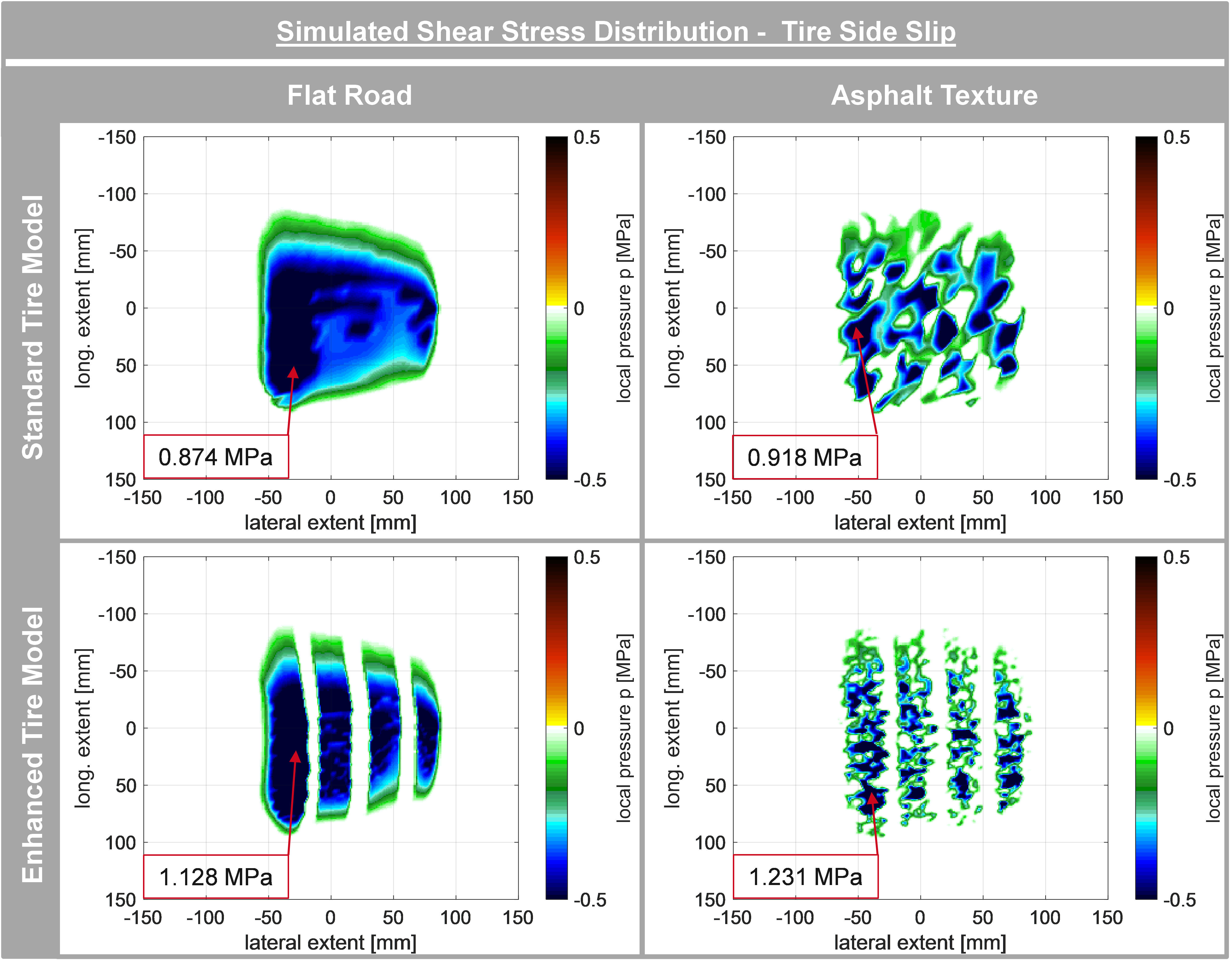FOR 2089
Multi-criteria evaluation and design of the road surface layer as interaction partner of the tire
The aim of the research group (FOR 2089), a cooperation of five Institutes from the Universities in Dresden, Stuttgart and Aachen, is to provide the basis for the development of more durable road surfaces through a coupled consideration of the road-tire-vehicle system. ika focuses on the consideration of vehicle-induced road loading and the interaction between tire and road.
An essential working point of the project is the investigation of the question whether the extension of existing tire models by a module for the consideration of the road surface roughness allows an improved correlation to real experimental data. Current vehicle simulation approaches consider only the road surface macro-roughness (wavelengths > latitudinal surface or heights of unevenness >> 1 mm) to describe the force transmission between road and tire. Effects of the macro roughness influence the state variable wheel load, whereas effects of the meso roughness additionally influence the pressure distribution in the lashing. As the tire model conditioning is done by measurements on a flat test bench surface (drum or flat track), but real road surfaces can have very different meso roughnesses, a clear uncertainty in the prediction of the driving behaviour can be assumed. Since the maximum frictional connection and thus, among other things, the lateral guiding force are reduced by the meso roughness, these effects are particularly relevant in terms of driving safety.
In addition to the mobile tire test stand (FaReP), the ika has in-house access to a highly dynamic flat track tyre test stand (MTS Flattrac CT+). The measurements on the Flattrac are used to determine tire data with which FTire tire models are parameterized. In addition to the total force, these models will also output the local vertical and horizontal forces in the tire liner, which have not yet been validated at this level of detail in previous studies. For this purpose, a special measuring technique is installed on the test site of the ATC, which consists of 40 force measuring punches with an edge length of approx. 8 mm and can provide precise information about the contact forces in all three spatial directions. For this purpose, the FaReP rolles over the sensor, which makes it possible to adjust the operating point of the tire exactly compared to the road test. The determined pressure and shear stress distributions are integrated into the parameterization process of the tire models in addition to the exact geometry of the tire.

Measurements are carried out with the same tire on the ATC test site using the FaReP. In addition to vertical wheel loads, the longitudinal and lateral forces in different tire operating conditions on different road surfaces can be determined. The surfaces of the roadways are also scanned with high precision and an ergodic replacement road is extrapolated without periodic events, so that the simulations and real tests are comparable. Only the validation of this new discretization stage will make it possible to generate statements about road load, friction coefficient and rolling resistance up to a multi-dimensional load on individual grains by means of a vehicle dynamics simulation.

Contact
Dominik Werner M.Sc.
Head of Vehicle Dynamics & Acoustics
+49 241 80-29383
Email
Gordon Witham M.Sc.
Head of Energy & Powertrain Systems
+49 241 80-23919
Email
Project duration
01/2015 – 12/2020
Project partner
ISD, TU Dresden; ISAC, RWTH Aachen University; ISV, Universität Stuttgart; Sbw/StB, TU Dresden
Supported by
![[Logo: Deutsche Forschungsgemeinschaft (DFG)]](/images/foerderer/dfg.svg)
Service
Cooperations
Address
Institute for Automotive Engineering
RWTH Aachen University
Steinbachstraße 7
52074 Aachen · Germany


![[Logo: Institute for Automotive Engineering (ika)]](https://ika.rwth-aachen.de/images/ika-logo-a-blau-blau-rgb.svg)